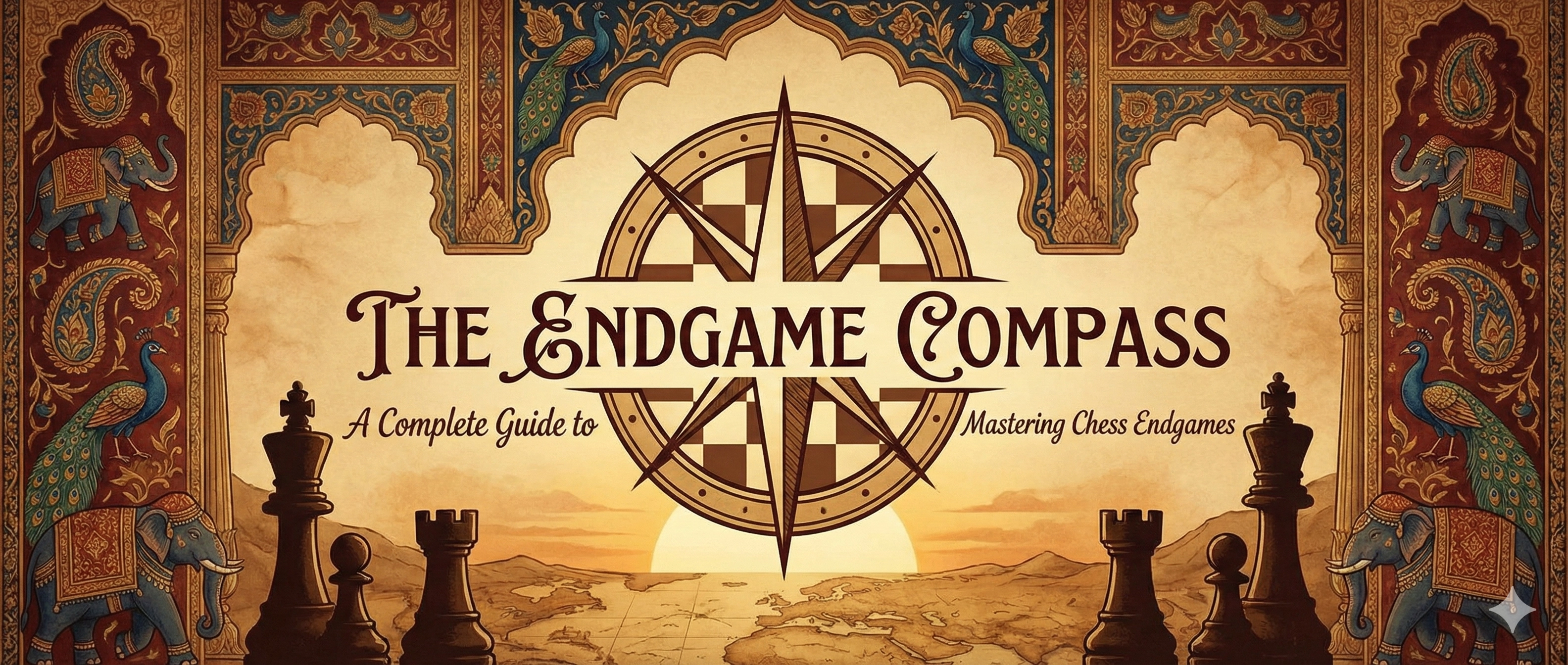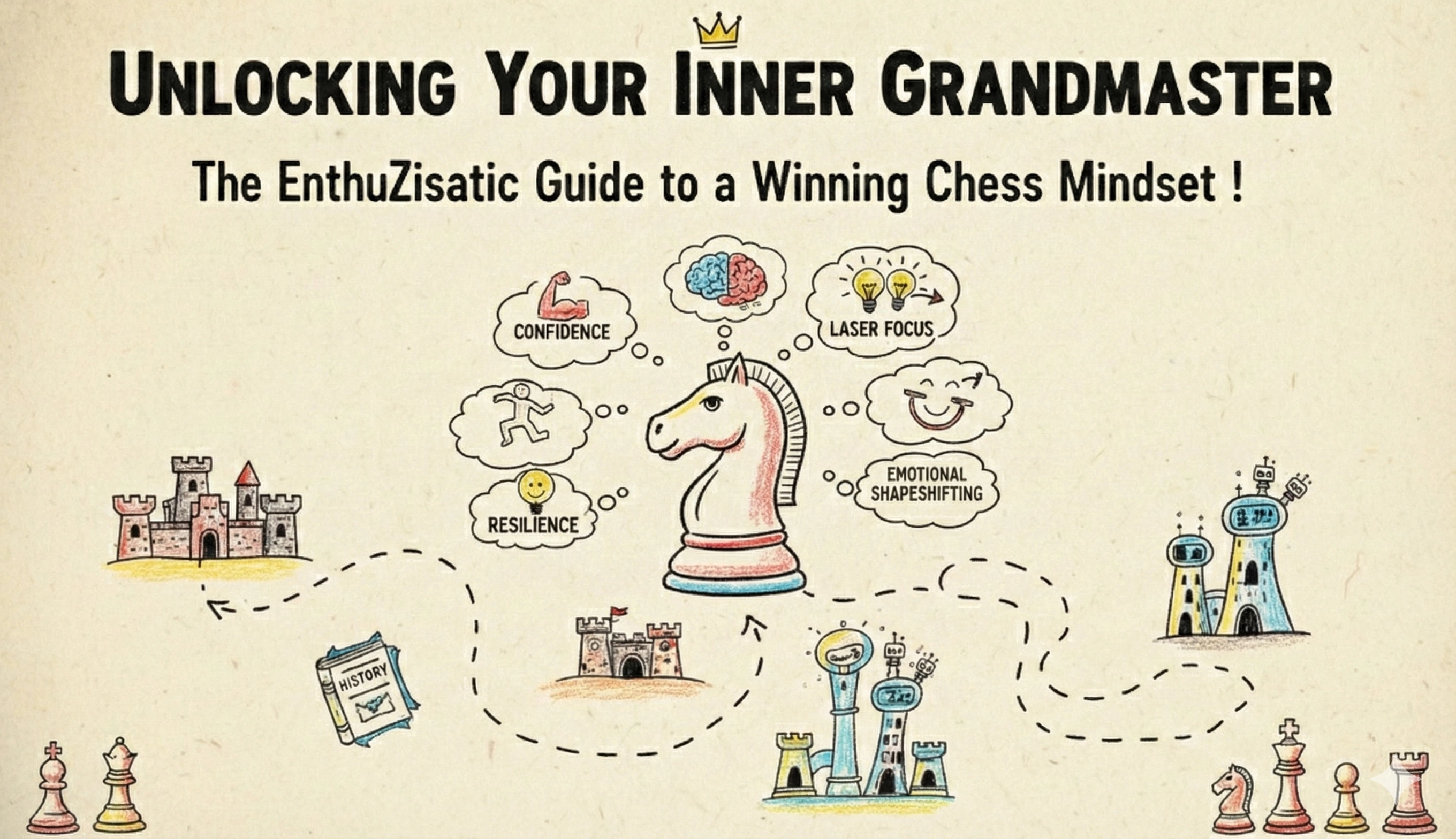Did you know that GM Abhimanyu Mishra holds the title of the Youngest Chess Grandmaster in history? Yes, he won the title at the age of 12 years, 4 months, and 25 days only.
If you wish to become a Grandmaster in Chess just like Abhimanyu Mishra then let me tell you that it is not impossible. The challenge lies in that less than 2,000 players worldwide have claimed to have won the honor. Grandmaster status in Chess is a goal that is reachable regardless of difficulties.
But it requires commitment and patience. If you are wondering, "How do I become a Grandmaster in chess?" your concerns will be addressed soon.
- Who is a Chess Grandmaster?
- 1. Ten Steps to Become a Grandmaster in Chess
- Understand FIDE
- Start Playing Chess Young
- Learn to Learn
- Create Opening Strategies
- Plan Strategically
- Learn Your Positions
- Understand the Endgames
- Learn from the Grandmasters
- The other ways that will help you to get more understanding of Grandmasters' moves are
- Create a Desire to Win
- Can you handle that stress?
- 2. Understand Yourself as a Chess Player
- 1. Ten Steps to Become a Grandmaster in Chess
- Conclusion
- FAQs
Who is a Chess Grandmaster?

The Grandmaster (GM) title is the highest honor in chess and once earned, it lasts for life. Beyond this title, many players aim to compete for and win the World Championship. Most grandmasters continue to play professionally, showcasing their skills in the toughest competitions.
1. Ten Steps to Become a Grandmaster in Chess
Let me begin by saying that these 10 steps will help you to turn this dream into a reality. So, here we go!
Understand FIDE

You must know FIDE. A worldwide chess regulatory organization is FIDE or the World Chess Federation. Based on how you performed, it awards you a rating. The FIDE gives the Grandmaster title. As a result, you must first earn FIDE ratings, that is, be an FM, to compete in Chess at the FIDE level.
You must participate in FIDE-rated chess tournaments for that. Now that you have earned the necessary FIDE ratings and standards, you can begin winning the relevant chess titles. Another important step after playing hours of Chess and acquiring the necessary ratings, is to refer to the FIDE handbook.
The methods and guidelines for progressing through the chess world's international rankings are fully explained in this book. The book says, "It is possible to become a grandmaster with dedication, drive, and thousands of hours of chess."
Start Playing Chess Young

Most chess grandmasters were introduced to the game even before they turned the age of 5. On the other hand, chess players such as Harry Nelson Pillsbury started playing Chess at 16. So, how can we determine the best age to learn chess?
To be a grandmaster, you do not necessarily have to start playing chess from a young age. But, starting young has its advantage. It helps to have played a while and develop important chess skills.

Younger players can recall and retain patterns more efficiently because their brains are more elastic. To defeat the world's top players, grandmasters must be familiar with almost 100,000 different chess patterns.

Learn to Learn

Maybe you have defeated your peers in several games of chess! Or, you have dedicated a lot of time practicing Chess! Still, you need to mentally prepare to develop your chess skills.
To keep pushing, to win even when you fail, you must learn how to learn. The top chess players upgrade their deep learning. They plan their movements, replay games, and train.
They also become familiar with the chessboard's squares. Chess is a science. Therefore, you need to develop your chess skills more than simply short-term retention of movements. As a player, you have to absorb the game.
Create Opening Strategies

But what makes a Chess player grandmaster is their ability to familiarize themselves with every chess move, opening, closing or middlegame. You must divide the game into smaller portions. If you want to be amongst the top chess players, you will require a wide variety of daring and strategic opening moves.
Also, you should be able to adjust your strategy as the game moves. Next, you must perfect your finishing skills. You should be able to predict what your rivals will do and how to beat them with proper practice and the correct information.
You can defeat the most experienced opponent if you accept that you will face a lot of surprises in a game. And remember, Grandmasters, are aware that their rivals research their movements.
Plan Strategically

Chess strategists are skilled at predicting future moves and reacting to them. They should possess a chess sense, which can only be learned via playing countless games and being aware of the various movements, openings, and endgames.

Any game can make you a Grandmaster because every skilled Chess player has the potential to defeat any Grandmaster. Emanuel Lasker, an International master and former World Champion said, "When you see a good move, wait- look for a better one!"
Learn Your Positions

A Grandmaster needs to have knowledge of positional or theoretical Chess. You should understand the pieces' movement and how the pawns might change the outcome.
Players who are good at positional chess can guess moves before they occur. Remember that if you have researched the chess moves of the previous Grandmasters, so have your rivals. Therefore, you need to play smart.
Understand the Endgames

Knowing how to begin and maintain a chess game is not enough. In a box: A skilled chess player can end a game in no time! However, to ultimately succeed, you must play every piece, including pawns. Additionally, you must be able to recognize the endgame plans of your rivals.
Learn from the Grandmasters

Mastering openings and endgames is key to becoming a stronger chess player. Every match demands that you recall tactics and strategies, because even a small flaw can be quickly exploited by your opponent. At the same time, studying the games of past Grandmasters helps you recognize patterns, spot weaknesses in rivals, and sharpen your own play.
The other ways that will help you to get more understanding of Grandmasters' moves are
Practically playing the moves on your board
Seeing Grandmasters' play on the video
Talking to a Grandmaster
When you know the strategies that work for you, you will quickly grasp the winning moves.
Create a Desire to Win

Did you know that on March, 2004, Magnus Carlsen qualified for his second gm norm by defeating Anatoly Karpov? You need to have the desire to win, just like Magnus Carlsen.
If your head isn't in the correct place, no amount of studying or learning movements will help. The arena will be crowded when you compete in competitions, and fans will be there.
Can you handle that stress?
If the response is "no," you'll never succeed in becoming a grandmaster.
2. Understand Yourself as a Chess Player

You must learn from your failures because you will surely make them. Create a plan to take advantage of your mistakes. Don't be too hard on yourself for your defeats. Improve yourself by boosting your strategic skills.


Conclusion
Earning the Grandmaster status in Chess might take a lifetime to achieve. The target is complex, and not many Chess players succeed at it. Remember, it is imperative to acquaint yourself with the usage of chess clock within a game to understand how time constraints can create a pressure-cooker environment.
The top chess players train themselves to play the game to learn new winning strategies. With commitment, patience, and many hours of chess practice, anybody can become a grandmaster.
FAQs
1) How long does it take to become a Grandmaster in Chess?
Focused Chess players may complete FIDE's standards to become grandmasters in at least 8 to 12 years. Of course, your excitement for the game, degree of dedication, ability, and work ethic will play a role in this.
2) How hard is it to become a Chess Grandmaster?
To win a Grandmaster title, you must work hard and be very committed. Only around 1500 of the approximately 800 million chess players worldwide are grandmasters. As a result, only roughly 0.3% of all FIDE-registered players presently claim the title of Grandmaster.
3) Is Chess good for your brain?
Chess improves mental function, memory, cognitive skills, creative planning and concentration, and brain health.
4) Do Chess players have a high IQ?
A chess rating of up to 2000 is standard for someone with an average IQ. Excellent grandmasters with ratings of 2600 and higher are predicted to have IQs of at least 160.






Comments